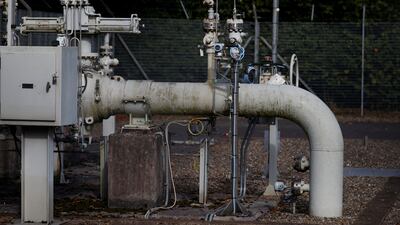A gas pipeline connecting Lithuania and Latvia was hit by an explosion on Friday but there was no immediate evidence of an attack, Lithuanian gas transmission operator Amber Grid said.
Video published by Lithuania's public broadcaster LRT showed a fire raging at the blast site in Panevezys county in the northern part of the country.
“According to the initial assessment, we do not see any malign cause, but the investigation will cover all possible options,” Amber Grid chief executive Nemunas Biknius told a news conference.
The supply of gas has been cut off and the flames were expected to soon subside, he added.
Lithuania, like war-torn Ukraine, borders Russia and is situated on the Baltic Sea, where the Russia-to-Germany Nord Stream gas pipelines were destroyed by explosions last year.
Flames rose about 50 metres in the air and could be seen at a distance of at least 17 kilometres, LRT reported.
Povilas Balciunas, the head of public administration in the nearby town of Pasvalys, told Reuters the flames were still burning at 5.50pm GMT.
“The firefighters are not fighting the fire at the moment, as currently it's a big torch of gas, and all effort to put it out would be futile, it would just waste water,” Mr Balciunas said.
Firefighters are standing nearby in case the fire spreads, he added.
Police were preparing to evacuate a village near the site, Baltic news agency BNS reported.
There were no injuries or fatalities reported, it added
Jeff Buckley: From Hallelujah To The Last Goodbye
By Dave Lory with Jim Irvin
How much do leading UAE’s UK curriculum schools charge for Year 6?
- Nord Anglia International School (Dubai) – Dh85,032
- Kings School Al Barsha (Dubai) – Dh71,905
- Brighton College Abu Dhabi - Dh68,560
- Jumeirah English Speaking School (Dubai) – Dh59,728
- Gems Wellington International School – Dubai Branch – Dh58,488
- The British School Al Khubairat (Abu Dhabi) - Dh54,170
- Dubai English Speaking School – Dh51,269
*Annual tuition fees covering the 2024/2025 academic year
A timeline of the Historical Dictionary of the Arabic Language
- 2018: Formal work begins
- November 2021: First 17 volumes launched
- November 2022: Additional 19 volumes released
- October 2023: Another 31 volumes released
- November 2024: All 127 volumes completed
Why are asylum seekers being housed in hotels?
The number of asylum applications in the UK has reached a new record high, driven by those illegally entering the country in small boats crossing the English Channel.
A total of 111,084 people applied for asylum in the UK in the year to June 2025, the highest number for any 12-month period since current records began in 2001.
Asylum seekers and their families can be housed in temporary accommodation while their claim is assessed.
The Home Office provides the accommodation, meaning asylum seekers cannot choose where they live.
When there is not enough housing, the Home Office can move people to hotels or large sites like former military bases.
Tightening the screw on rogue recruiters
The UAE overhauled the procedure to recruit housemaids and domestic workers with a law in 2017 to protect low-income labour from being exploited.
Only recruitment companies authorised by the government are permitted as part of Tadbeer, a network of labour ministry-regulated centres.
A contract must be drawn up for domestic workers, the wages and job offer clearly stating the nature of work.
The contract stating the wages, work entailed and accommodation must be sent to the employee in their home country before they depart for the UAE.
The contract will be signed by the employer and employee when the domestic worker arrives in the UAE.
Only recruitment agencies registered with the ministry can undertake recruitment and employment applications for domestic workers.
Penalties for illegal recruitment in the UAE include fines of up to Dh100,000 and imprisonment
But agents not authorised by the government sidestep the law by illegally getting women into the country on visit visas.


